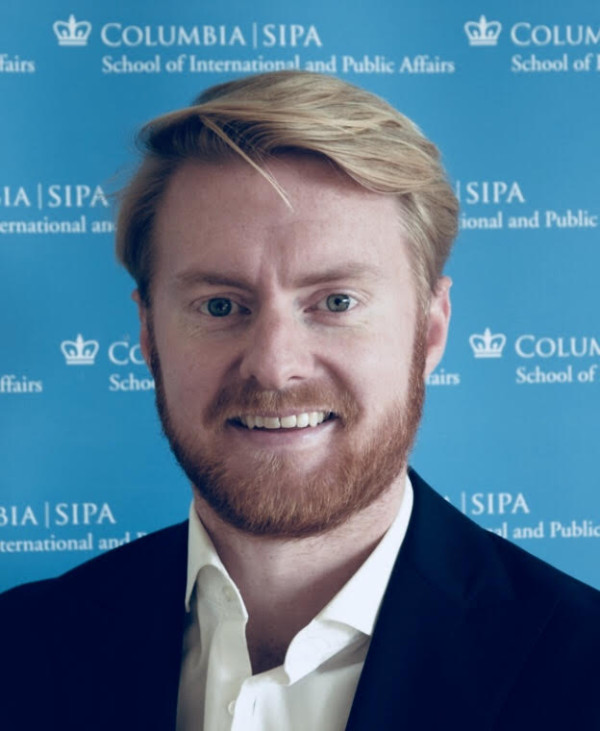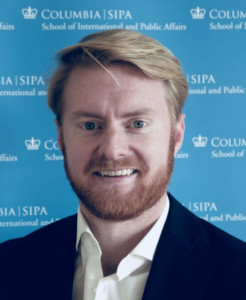Meet Even J. Kvelland, 2017-18 Thanks To Scandinavia Hebert Singer Memorial Scholar at Columbia University School of International and Political Affairs


Even Kvelland is a Norwegian student pursuing his Master’s of International Affairs at Columbia focusing on the intersection of geopolitics, security, and energy. He holds a B.A. in Government from Macalester College where he was a Kofi Annan Scholar. Even has worked as an advisor at the U.S. Embassy in Oslo heading the education and research portfolio and promoting trans-Atlantic student and research exchange. He has also worked for the Norwegian Ministry of Foreign Affairs, in private sector consulting, for UNDP, and spent a year in Kenya as a project manager for the Red Cross and as a researcher for NATO on East African energy markets.
Can you tell us what the TTS scholarship means to you?
The TTS scholarship means a great deal to me. The scholarship allowed me to pursue my dream of studying at Columbia. I visited the university a decade ago and was struck by the energy on campus. The School of International and Public Affairs (SIPA) is a unique school in the sense that it is among the most diverse schools of its kind, attracting students from nearly a hundred different countries and backgrounds as diverse as engineers, lawyers, political scientists, and medical professionals.
However, being a TTS scholar also has meant getting to know the history of TTS as an organization, but, perhaps more importantly, the reason behind its founding. I have appreciated learning more about the rescue of Jews in both Norway and the other Scandinavian countries. This is a significant chapter of the World War and the overall history on our countries. In Oslo I lived close to the synagogue and seeing the small Jewish community was a constant reminder about how many people never returned after the war.
What started your interest in international affairs and why did you select Columbia for your American education?
I have always been very interested in politics, both domestically (in Norway) and internationally. The interest partly comes from being brought up in a family that likes to discuss current affairs and has encouraged me to be cognizant of the world around me. I spent a year as a foreign exchange student in the U.S. and was fascinated by my civics’ class take on the U.S. political system. So when I came to college, selecting a major was fairly straightforward. Both Macalester College, my alma mater, and Columbia are progressive institutions that push students to explore the intellectual worlds of politics and philosophy. What further attracted me to Columbia was its unparalleled program in international affairs and energy policy where classes are taught by some of the world’s foremost energy experts. Columbia also embraces a practical approach to teaching, where professors want us to understand how the theory translates to the real world. We therefore spend a great amount of time analyzing various current events based on the frameworks learned in the classroom.
What do you think is most valuable about international education?
That it challenges your preexisting views. All people live in bubbles to a lesser or greater extent. That is very comfortable and part of human nature. Traveling and reading are ways to expand one’s views. However, I don’t think anything can rival the impact of studying abroad in this regard. Being a foreign exchange student in rural Wisconsin as a 17-year old challenged my views enormously. It was at times uncomfortable, but the most pivotal year of my life. Living abroad and coming back to the U.S. for both college and graduate school have further pushed me out of my comfort zone. It has allowed me to get to know people whose views and opinions are very different from mine.
Tell us more about “the intersection of geopolitics, security, and energy,” and why you think it’s so important.
I find this intersection really interesting as so much of the world’s politics is about this Venn diagram. For instance, when the U.S. Geological Survey in 2008 reported that the Arctic was home to vast reserves of oil and natural gas, the eight Arctic circumpolar countries responded by increasing their interest. Russia planted a flag on the bottom of the Arctic and there was consequently much speculation about another ‘scramble for resources’. Because energy is so important to the economic prosperity of countries, the potential for conflict is always lurking.
What are your post-graduate plans?
It is still somewhat uncertain. I am very interested in both the energy and international affairs fields. I can see myself going in either direction, working for a company like Equinor (formerly Statoil) that is making a transition from only oil and gas into the renewable energy space or in the international affairs realm, for instance in diplomacy. A third alternative is to combine these two passions. That could be working in the field of political risk analysis and assisting energy companies make sense of the political climate in a given country, for instance before they enter a new market or conduct an acquisition.
How have your travels to Kenya and study in the U.S. affected your global outlook?
Living in Kenya showed me how diverse the world is. In Kenya alone, there are nearly 70 distinct languages spoken by various tribes and ethnic groups. On the African continent, as many as 2-3000 languages are spoken, yet we often fail to distinguish the countries and simply group them together as “Africa”.
Living in Kenya also showed me the difficulties of development practice. So often Europeans and Americans think we know what people need, but it fails to take into account the vast differences between countries and the different people within one country. For instance, there was an American NGO that came to western Kenya where I lived and gave people cows because, based on their extensive theoretical framework, that would help people get out of poverty by selling milk and making dairy products. However, this particular tribe in this area doesn’t care for cows since chickens are their staple food. Thus, the cows died and the project failed because the NGO didn’t know the local community and hadn’t actually spoken to the people there, asking what they needed.
My experiences from living abroad have made me very culturally sensitive. It is easy to think that because something works in place A it should work in place B. But the world is complex. I therefore think approaching new places with humility and a desire to listen and learn is crucial. I have learned so much from living abroad and it has made me appreciate different views.
What is your most critical concern about the direction of international affairs?
There are a number of concerns on the international arena, so it’s hard to just pick one. However, I think that the rise of populism that is sweeping across many countries is a serious challenge to the liberal democratic systems we have built in the U.S., Europe and elsewhere. When it is so easy to dismiss virtually anything as “fake news” it is very difficult for people to know what to make sense of. As such, I think it is ironic that while we have never had better access to information through a range of channels, sorting hard facts from opinions and untrue statements have never been harder. So many populist politicians are targeting immigrants and using them as scapegoats. One of the great things about living in New York is the constant reminder of the beauty of diversity. I firmly believe that a diverse society stands much stronger in the face of challenge than a homogenous society where conformity of thought is the norm.
What do you feel is most positive about the current global political climate?
While progress in the world sometimes feels to be going to wrong way, I think we are still moving forward with great strides. Hundreds of millions of people have in the last couple of decades gained access to electricity. The number of people below the poverty line is decreasing. There is a growing consciousness about protecting our planet from climate change, the Paris agreement being one example of success. The interconnectedness of the world has tremendous potential to bring key interlocutors, including young people, together and I think that is very encouraging for the future.
What are you most passionate about?
I am passionate about several things. First, I am very passionate about international education. As mentioned above, I think it offers tremendous opportunities to expand one’s worldview. The work that TTS and all the donors do is excellent and I wish more people and organizations can rally behind such initiatives. Second, I am passionate about access to clean energy. I have this semester being working on a project to expand access to clean energy in Tanzania. With fellow students from Columbia, we visited Tanzania over spring break and interviewed stakeholders in both the government and private sector and have come up with proposals that will make it easier for private companies to enter the market with solar energy products for people in rural villages. Third, I am passionate about equality. This is a wide idea, but I care deeply about access to education and health care – two important factors for socio-economic development. Moreover, I also care about gender equality and am disturbed by the unequal treatment of women in the workplace, lower pay on average, and all the stories coming out recently about sexual misconduct by men in the workplace.
Interview conducted in June 2018.